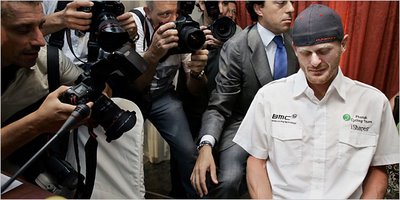 Floyd Landis at a news conference in Madrid. Image Credit: Jasper Juinen/Associated Press
Floyd Landis at a news conference in Madrid. Image Credit: Jasper Juinen/Associated PressFloyd Landis gave an interview and defended himself along with his Doctor stating that Testosterone is not a friend ... but an enemy to the bicycle racer's performance.
Further, Landis, through the statements of his lawyer, Luis Sanz, said he fully expected the backup test to come back with the same result, because the testosterone imbalance was produced naturally by his [Landis'] body.
What is at question here is the difference in levels between testosterone and epitestosterone that appear in the body. The blood testing showed an abnormal balance/ratio in the levels of testosterone/epitestosterone.
Excerpts from the New York Times -
Testosterone Seems to Be Enhancer of Choice
By JULIET MACUR – New York Times - Published: July 31, 2006
When a doping scandal shook the Tour de France on the eve of this year’s race, Floyd Landis climbed onto his bike, unscathed. When a doping investigation involved some of track and field’s most high-profile figures, the sprinter Justin Gatlin continued to compete, untouched.
But last week, Landis, the Tour de France winner, and Gatlin, who shares the world record in the 100 meters, were no longer on the outside looking in. They were ensnared in the net of drug testing, with the same substance, testosterone, at the center.
For some, last week’s news is a sign that doping controls have improved, but it may also be evidence that some athletes remain undeterred, tempted to break the rules by the promise of money and fame.
“Many more athletes are going to get caught, and it’s going to get ugly,” said Dr. Steven Ungerleider, an antidoping expert who wrote the book “Faust’s Gold: Inside the East German Doping Machine.” “I think people need to brace themselves for some darker clouds on the way here.”
Landis was found to have an illegally high ratio of testosterone to epitestosterone after his Stage 17 performance during the Tour, which moved him to third place in the standings from 11th and back into contention. If the results of his backup urine sample, which could be released as early as today, confirm the initial positive result, he will be stripped of his Tour de France title and face a two-year ban from the sport. If the result comes back negative, the doping charges will be dropped.
Gatlin, who also failed a drug test in 2001, may already face a lifetime ban. He tested positive for testosterone or its precursors on April 22, after the Kansas Relays, and announced the result Saturday.
----
“When the smoke clears, I think we’ll all go back and look at what we’ve done to Floyd,” said Landis’s doctor, Brent Kay, in a teleconference Friday.
----
In track and field, a host of athletes have tested positive for abnormal testosterone levels. The sprinter Dennis Mitchell, an Olympic gold medalist from the United States, tested positive for a high testosterone-to-epitestosterone, or T/E, ratio in 1998, claiming that alcohol and sex with his wife had caused the positive test. In 1997, the distance runner Mary Decker Slaney also tested positive for a high T/E ratio. Both athletes won on appeal, but an international panel overturned those decisions. They were barred from the sport for life.
But Kay could not see why a cyclist would take testosterone. He said it would make the rider slower because it is an anabolic steroid that builds muscle.
----
Scientists like Dr. Donald H. Catlin, who runs the Olympic drug-testing laboratory at U.C.L.A., say that athletes might use testosterone to recover quicker. The former professional cyclist Jesús Manzano said he was given testosterone when he competed for the Kelme team, and said he immediately felt the positive effects.
In an essay in the Spanish sports newspaper AS on Saturday, Manzano wrote: “It gives you a lot of strength, and it works very well. It produces a euphoria.”
John Hoberman, a University of Texas professor who wrote the book “Testosterone Dreams: Rejuvenation, Aphrodisia, Doping,” said: “These people who are using it are probably doing what they thought was low dosing and thought they could probably get away with it. The idea that these are all clever people who are doing it right is erroneous.
“Some are doing it better than others. Some are using physicians. Some are using it on advice from another athlete.”
----
Still, even Landis admitted that a dark cloud would remain over him and the sport. And Andy Rihs, Landis’s team owner and owner of the Swiss hearing-aid company Phonak, has agreed.
After so many of his riders have tested positive since the team’s inception two years ago, including the 2004 Olympic gold medalist Tyler Hamilton, Rihs announced last month that he would abandon his sponsorship of the team.
In an article in The Times of London last week, Rihs summed up the reason: “Where there’s money, there’s doping.”
Read All>>


No comments:
Post a Comment